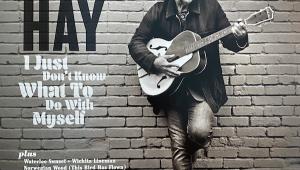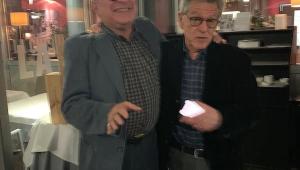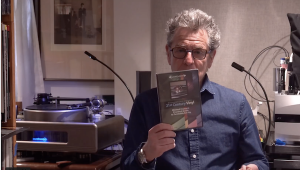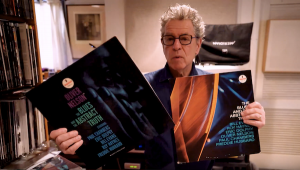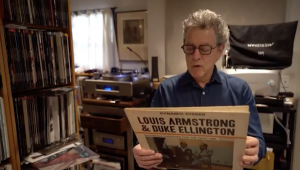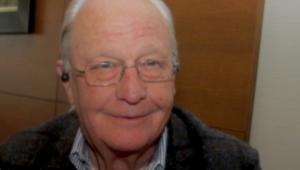I want that graffiti wall cut out and hung in my house!
Rufus Wainwright Continues to Unfollow the Rules With the Fully Animalistic Verve, Panache, and Dream Realizations on His Vibrant New 2LP Set, Folkocracy

Rufus Wainwright has pretty much followed the beat of his own musical drum since Day 1. Over the course of his multi-decade career, besides flexing his impeccably ingrained singer/songwriter chops that have often fused alt-rock proclivities with the compositional scope of George Gershwin and Franz Schubert, the Canadian-American songsmith has also seen fit to compose a pair of classical operas and commemorate the 400th anniversary of William Shakespeare’s death with his expertly compiled and lovingly curated Deustche Grammophon LP, April 2016’s Take All My Loves: 9 Shakespeare Sonnets.
For his next act, Wainwright has returned to his other true roots with a new 2LP set dubbed Folkocracy, which was released via BMG today, June 2, 2023. The four-sided, 60-minute song cycle runs the gamut of a modern-yet-vintage blend of traditional folk (“Down in the Willow Garden,” “Shenandoah”) and more contemporary fare (Neil Young’s “Harvest,” Wainwright’s own “Going to a Town”) alike.
The stats are these. Folkocracy was produced by Mitchell Froom; engineered by David Boucher, Jonathan Kaspy, and Chris Sorem; and mastered by Bob Ludwig at Gateway Mastering. The standard-grade black vinyl LPs have been pressed at Precision in Ontario, and the SRP for this 2LP set is $41.99.

Wainwright trusts Froom’s production instincts implicitly. “Mitchell was really the conductor of this piece,” he admits. “I initially went to him with about 30 or 40 songs I thought would be interesting to cover and said, ‘You pick what you think would make a great album.’ He subsequently did — and I agreed with every choice he made. When it came to the final sequencing, I said, ‘Why don’t you just continue the process here?’ I really let him direct it.”
It should be noted that Folkocracy is also awash with a cavalcade of storied guests that include the likes of Susanna Hoffs, Sheryl Crow, Chris Stills, Brandi Carlile, John Legend, David Byrne, Chaka Khan, Andrew Bird, and Van Dyke Parks. “I was totally thrilled that they all wanted to be a part of it,” Wainwright confirms.
Incidentally, Folkocracy is also being duly feted here on June 2 with a one-night-only release-day concert event being held at Walt Disney Concert Hall in Los Angeles, with Wainwright accompanied by a six-piece band and a litany of special guests including fellow Folkocracy collaborators Khan, Parks, Hoffs, Lucy Wainwright Roche, Richard Parks, and Madison Cunningham.
In a recent Zoom interview, Wainwright, 49, and I discuss why Folkocracy belongs on 2LPs instead of one and confirms the only song on the album he knew he had to go back and redo the vocal for, emphasizes the importance of maximizing his family connections on the second LP, and reveals his “secret dream” for how he’ll be able to thwart A.I. artistically. Making my own way home / Ain’t gonna be alone. . .
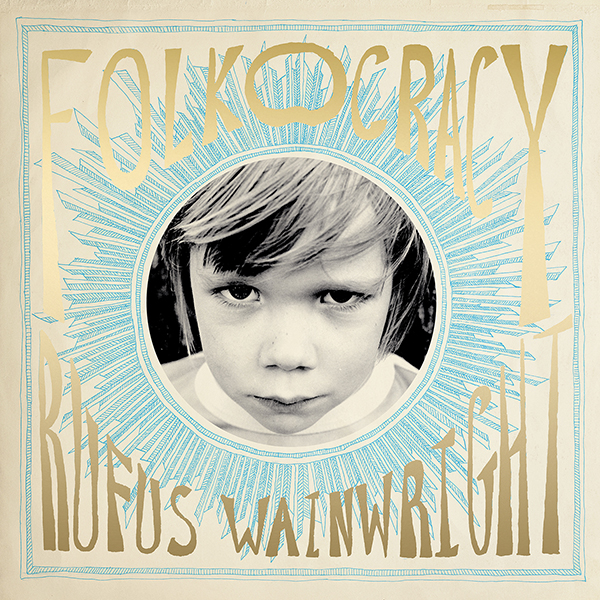
Mike Mettler: I’m really glad you, as the artist, decided Folkocracy needed to unfold across four sides instead of trying to cram everything onto a single LP, or even just three sides. Are you happy with that decision?
Rufus Wainwright: Yeah, yeah. Certainly this album is more akin to the vinyl medium mainly because it’s a two-album set, though the second one is quite short. There are a lot more songs on the first one [with five songs on Side A, and five on Side B] than on the second one [with three songs on Side C, and two on Side D] — so it’s not interminable. (chuckles) We actually had a listening [session] for it last month at this very interesting place — Supervinyl, in Los Angeles. A lot of people came to it and, yeah, it really worked well.
Mettler: It’s great to hear that. Did you listen to a test pressing of Folkocracy yourself? Did your producer Mitchell Froom do that too?
Wainwright: We both did. He listened to one, and I listened to one.
Mettler: Did you have any notes on it?
Wainwright: I think we had to send it back once, yeah — I mean, I feel like we did. I tend to block a lot of those experiences out of my mind — the whole mastering thing, and listening to test pressings. I find it quite nerve-wracking, because it’s such a big decision to have to make.
Mettler: Well, it sounds to me like you guys made the right sonic choices here. On some of the songs where it’s just you and the piano, the character of how you sing and that of your accompaniment would be lost if it came across as being too compressed. Essentially, we’d lose just the “youness” of you, if I can call it that.
Wainwright: Yes, you can call it that. (both chuckle)
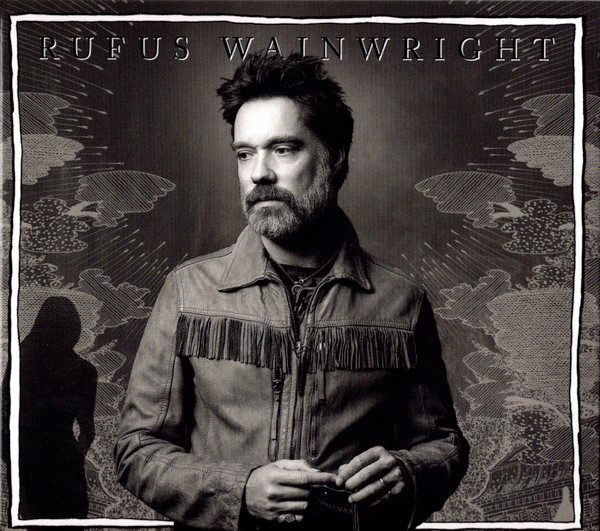
Mettler: Okay, good. Tell me about your relationship with Mitchell Froom. You and he have worked together for a while now. Do you feel like you guys have a good shorthand when you’re in the studio and being able to say, “This is what I need”?
Wainwright: Oh, yeah! Yeah. With Mitchell and I, it was kind of love at first listen. (both laugh) We really bonded so strongly when we made [July 2020’s] Unfollow the Rules together, right off the bat — and so I really wanted to do this record with him to continue that relationship.
Mitchell very much is a great combination of all the great producers I’ve worked with over the years. He has Jon Brion’s kind of sensibility and pop knowledge. [Brion co-produced Wainwright’s self-titled May 1998 debut album on DreamWorks.] Mitchell is also very kind. He’s a man for all seasons, in a lot of ways.
Mettler: Yeah, yeah, a man for “Four Seasons in One Day,” you could even say. I think he produced that song by a certain Crowded House entity.
Wainwright: (chuckles) Yeah, he did. [Sidenote: Mitchell Froom co-produced Crowded House’s July 1991 Capitol release, Woodface, which contains the aforementioned “Four Seasons in One Day.” Currently, Froom is also a touring member of Crowded House.]
Mettler: Anyway, I’ve watched the video clips you’ve released online where it seems like most everybody is recording in the same room together. That wasn’t done just for the video staging, right? Did you all actually record together in the same space?
Wainwright: We did that on purpose, yes. Well, I mean, it was on purpose, but it was also somewhat of an economical decision. With the last record, Unfollow the Rules, and this one, Folkocracy, I made them both in the new present environment, which is pretty threadbare compared to how I started out in the music business. (chuckles)
But I think it actually makes for, I don’t know — better recordings, because you really have to focus a lot harder. You have to. Also, everything needs to happen more in real time that way. You can’t noodle around as much, so I’ve actually found it quite exciting, in a weird way.
Mettler: I enjoyed seeing how you recorded Folkocracy like that, because I feel like the spatial, physical relationship between artists who are in a room together where you can look at each other makes for the creation of something special in the moment that can’t really happen otherwise. Wainwright. Yeah. Well, what it brings into it is time. That real-time element comes in, and it’s definitely very powerful — and very elusive. You don’t quite know how it’s affecting things, but nonetheless, it is.
Mettler: I saw you standing next to John Legend singing “Heading for Home” together, and the mikes you’re using there are from the ceiling down, as opposed to being floorstanding. Is that a conscious decision of something like, “I don’t wanna have the crutch of holding onto a microphone stand in the studio,” or did you just feel like, “I need the space to just kind of be myself here,” without having to even think about that?
Wainwright: That’s always how I’ve done it. That would be more of a question for David Boucher, the engineer who mixed it. I just stand and sing into whatever’s in front of me. (laughs)
Mettler: It’s always interesting to me to learn about a singer’s process in the studio. I’ve mentioned this before, but Johnny Mathis once told me he has a very specific physical distance from any microphone in any studio that he sings in. He has it measured quite exactly.
Wainwright: And you really hear that with him — you really do hear that. I’m a big Johnny Mathis fan, and you can definitely hear that he knew all the sweet spots his voice could hit, and how to really maneuver that with that incredible [vocal] instrument of his.
I’m a little more freestyle (chuckles), depending on the day. What I find most fascinating is that I’ll sing in a mike — you know, get up there, and do a few takes — and then when I go back and listen to it and it’s not what I want, I will then go and correct it. I just find the right distance, and I get the proper intent. It’s not cognizant. It’s like this strange, animalistic shift.
Mettler: It’s the creative instinct at work. You know when you’ve got it, and you know when you have to tweak it. Is there one Folkocracy song where you did something like that specifically?
Wainwright: Well, actually, there is one song. I feel bad that I’m giving this away (chuckles) — but it’s okay, I guess. As I said, most of the songs were recorded live in the same room, and in real time. But the one that I had to redo was actually “Shenandoah” [Track 5 on Side A], which is turning out to be one of the album’s big tracks. I recorded that live — totally live, with the band. I was isolated, and we came up with what I thought was a decent version.
Time passed, and I really wasn’t happy with my vocal. It wasn’t hitting the marks. So I actually redid that vocal singing much more, well — I was doing this different thing with it, so that one I had to redo. And now, it’s one of my favorite tracks on the album. But other than that one, most of them are totally live.
Mettler: Interesting. “Shenandoah” ends Side A, and then the mostly instrumental [Franz] Schubert track “Nacht und Träume” starts Side B. That one has got a Brian Wilson/Beach Boys vibe to it.
Wainwright: Yes! Yes.
Mettler: Were you sitting at the piano while you sang that one?
Wainwright: No, no. Mitchell [Froom] played and I sang, and then I did a bunch of overdubs over that — with the harmonies. I didn’t do that one all live. I didn’t sing ten harmony tracks by myself, totally live. (laughs heartily)
Mettler: Well, that would be a true superhuman feat if you had been able to pull that one off. (both laugh) And, pun intended, the tenor of your voice is very character-specific to who you are here. When you extend those wordless notes, you can tell the character literally between each one. Getting to hear all those nuances on vinyl is critical — especially with that song, and with The Mamas & The Papas track, “Twelve-Thirty (Young Girls Are Coming to the Canyon)” [Track 2 on Side A], which is complemented quite nicely by that photo of you [shown below, as taken by Miranda Penn Turin] at the base of Laurel Canyon that has quite the perfect 1966 vibe to it.
Wainwright: Yes — and it still feels like that around here sometimes, when you squint. (chuckles) But yeah, there’s still a little bit of that magic up here in Laurel Canyon, for sure.
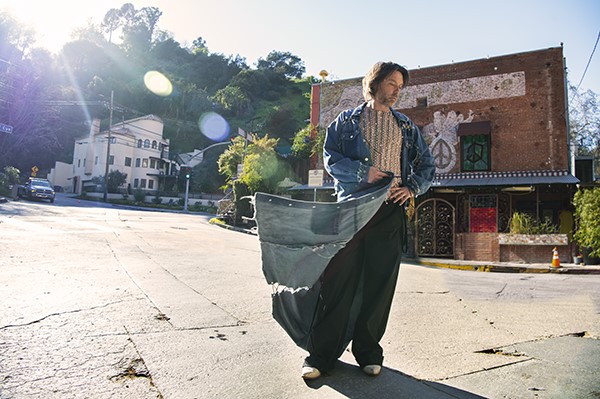
Mettler: I also love the vibe of those vocal blends on “Twelve-Thirty.” Did you just instinctively know Susanna [Hoffs], Sheryl [Crow], and Chris [Stills] had to be there?
Wainwright: Susanna and Sheryl were definitely Mitchell’s choices, since he had them in his back pocket (laughs) — but only in the best of ways. Only in the best of ways. He has a lot of people like that, actually, who he can call on who will do anything for him. People really adore him — as a person, mainly.
I’d always been a huge Bangles fan, so meeting Susanna was a thrill. What’s also fascinating is how she’s never changed. I mean, she still looks exactly as she did back then. She’s got some kind of ’80s superpower. She must have drunk some kind of something in 1987. (chuckles)
Mettler: Right — she has some kind of “Eternal Flame,” or whatever you want to call it.
Wainwright: Yeah, the “Eternal Flame” — there you go! [Sidenote: “Eternal Flame” was a No. 1 single both domestically and internationally for the Bangles in early 1989.]
Mettler: And then we get to a special familial vocal blend on the second LP with “Hush Little Baby” starting Side C with your sisters Martha and Lucy, and then there’s “Wild Mountain Thyme” with your aunt Anna [McGarrigle] ending Side D as a nice bookend to everything.
Wainwright: Yeah. We start to, I should I say, focus in on what matters — which is, you know, myself (laughs), alone at the piano. And, of course, with my family.
Mettler: Yeah, I’m gonna call that your own DNA-ocracy connection, right there. (Wainwright laughs heartily) Okay, I now have a two-part question. One, do you remember the first record you bought as a kid on vinyl that you felt like, “This is a record I bought, and it’s mine”?
Wainwright: Oh yeah, yeah. The first record I bought — oddly enough, I remember my first cassette tape more. I don’t know if I was allowed to buy vinyl yet because I was, you know, too messy. (both laugh) But the first real vinyl that was mine was by Eurythmics, Sweet Dreams Are Made of This) [released on RCA in January 1983]. Yeah, that was it.
Mettler: What a great way to start on vinyl, with an album featuring a vocalist as powerful as Annie Lennox and a still-underrated multi-instrumentalist like Dave Stewart. Okay, here’s part two of that question, then — is there a perfectly sequenced record, to you? As in, “This is the best record from start to finish”?
Wainwright: Well, I’ve spent a portion of my career doing one of the great records — which is, of course, the Judy Garland 1961 concert from Carnegie Hall. That’s right up there. [Sidenote: The album being referred to here is the July 1961 2LP set on Capitol titled Judy at Carnegie Hall – Judy in Person. Wainwright recreated much of it on his own recent 1LP release on BMG, June 2022’s Rufus Does Judy at Capitol Studios.]
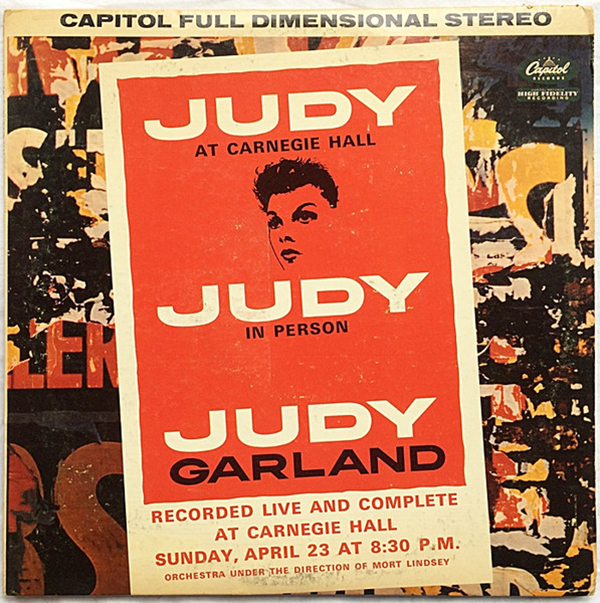
The other thing I love is — as you know, I’m a big classical music fan, and something that has always affected me deeply is Heliopolis by Schubert, and I love the album version of it by [German mezzo-soprano opera singer] Brigitte Fassbaender. Well, there are a lot of great versions of it. That one, of course, is an older piece, but it works perfectly on a record. It works so well on an album. It has all the right iterations, and it was also written long before albums. (both laugh heartily)
Mettler: And now we get to reap all the rewards of it on vinyl. Well, I know you have to head out pretty soon, so let’s wrap it all up with this. You’re soon celebrating a 50th birthday [in July] with some special events and performances over the summer and later on out in Montauk on Long Island, and I’m going to use that number and jump us 50 years into the future. So, it’s now gonna be 2073, and unless there’s some weird science stuff going on, I doubt you or I will physically be on the planet then, but who knows? Anyway, however people are listening to music in the future in 2073 and they type in the name “Rufus Wainwright,” what do you want them to get out of that experience?
Wainwright: Well, I would like them to find out about someone who’s real. I operate on a very animalistic level when I’m writing songs and lyrics, and I tend to not try to be too smart about it, or too clever. I’m very into “the moment.”
Like everybody else, I’m thinking a lot about A.I., and my little secret dream is that, by 2073, if they haven’t created an A.I. that is better than me — the one artist who could not be replicated! (laughs) — that would be somewhat due to my lack of certain abilities, my human qualities, my mistakes, and my failures. That’s the stuff that makes you great — and it’s what makes you interesting.
If I’m still around for my 100th birthday, then I’ll hold another concert, and you’re welcome to come. Just know that it will be held underwater if it’s at Montauk, though. (both laugh)
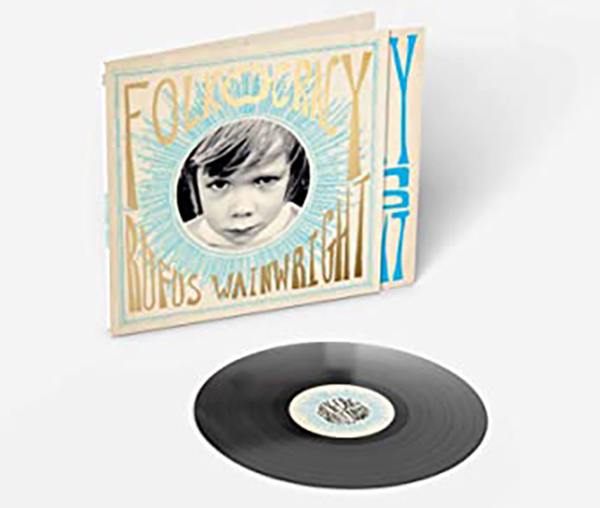
RUFUS WAINWRIGHT
FOLKOCRACY
2LP (BMG)
Side A
1. Alone (Feat. Madison Cunningham)
2. Heading For Home (Feat. John Legend)
3. Twelve-Thirty (Young Girls Are Coming To The Canyon) (Feat. Susanna Hoffs, Chris Stills & Sheryl Crow)
4. Down In The Willow Garden (Feat. Brandi Carlile)
5. Shenandoah
Side B
1. Nacht und Träume
2. Harvest (Feat. Andrew Bird & Chris Stills)
3. Going To A Town (Feat. ANOHNI)
4. High On A Rocky Ledge (Feat. David Byrne)
5. Kaulana Na Pua (Feat. Nicole Scherzinger)
Side C
1. Hush Little Baby (Feat. Martha Wainwright & Lucy Wainwright Roche)
2. Black Gold (Feat. Van Dyke Parks)
3. Cotton Eyed Joe (Feat. Chaka Khan)
Side D
1. Arthur McBridge
2. Wild Mountain Thyme (Feat. Anna McGarrigle, Chaim Tannenbaum, Lily Lanken, Lucy Wainwright Roche & Martha Wainwright)
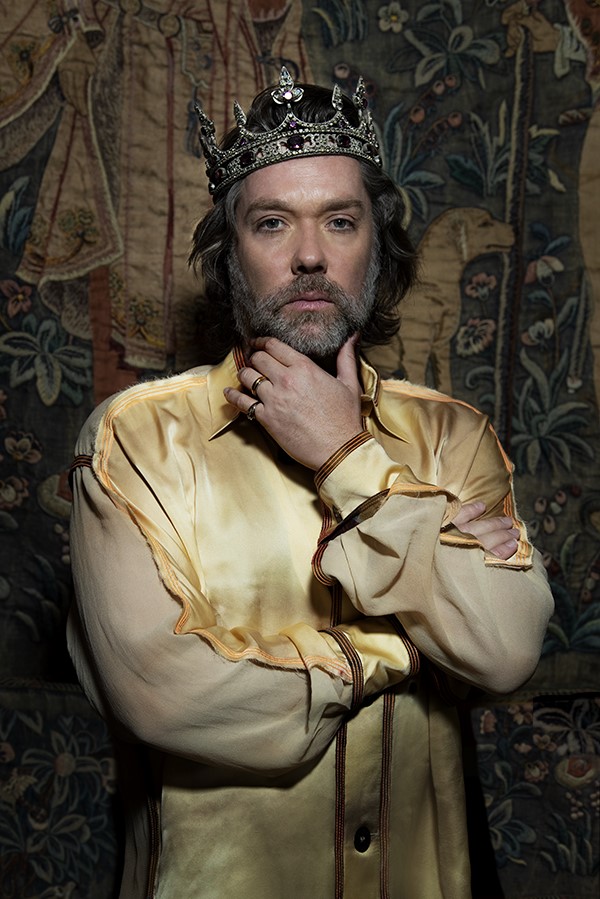
- Log in or register to post comments


Hello everyone, https://myforexvps.com/forex-vps-datacenters/ datacenters , I recommend these cool guys because they have a lot of different benefits, such as a statistics and reporting system for traders to track their performance, technical analysis tools to help predict market movements, what could be better?

Enjoy a high-quality VPS Forex with outstanding performance at an affordable price. Perfect for stable and secure trading, without worrying about high costs.
Visit: SocialVPS



